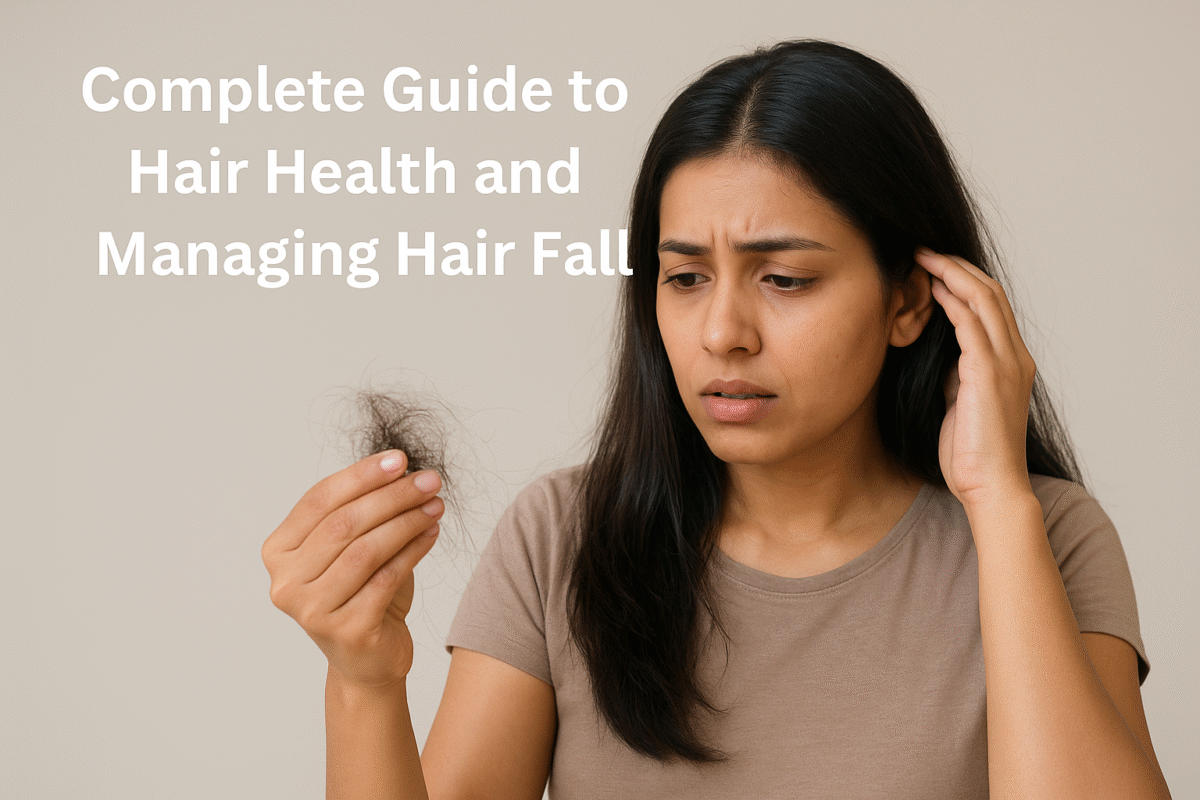Hair fall is a common issue faced by men and women of all ages. While shedding some strands daily is normal, excessive hair loss can be distressing. Understanding the causes, identifying the right hair fall treatment, and adopting healthy habits can make a real difference. This guide explains everything you need to know about maintaining healthy hair and managing hair fall naturally.
Understanding Hair Fall
Hair goes through a growth cycle that includes growth (anagen), rest (telogen), and shedding (catagen) phases. On average, losing 50–100 strands per day is normal. Hair fall becomes a concern when the loss exceeds this or leads to visible thinning.
Common Causes of Hair Fall
- Nutritional Deficiencies – Lack of essential vitamins like biotin, vitamin D, zinc, and iron weakens hair roots.
- Hormonal Changes – Pregnancy, menopause, or thyroid imbalances can lead to shedding.
- Stress – Physical or emotional stress can push hair into the shedding phase.
- Medical Conditions – Conditions like alopecia, scalp infections, or anemia can worsen hair loss.
- Improper Hair Care – Frequent chemical treatments, excessive heat styling, and harsh shampoos damage hair.
Hair Fall Treatment: Where to Begin
Effective hairfall treatment in Pakistan begins with understanding the root cause. Often, small changes in lifestyle, diet, or daily hair care routines can improve hair health without needing complex procedures.
Key Steps in Hair Fall Treatment
- Balanced Diet
- Eat protein-rich foods such as eggs, fish, nuts, and lentils.
- Add leafy greens, fruits, and seeds for vitamins and minerals.
- Gentle Hair Care
- Use mild shampoos free from sulfates.
- Avoid excessive brushing or tight hairstyles.
- Oil Massages
- Massaging the scalp with coconut, almond, or castor oil improves blood circulation and nourishes roots.
- Reduce Stress
- Practice yoga, meditation, or light exercise to manage stress levels.
- Consult a Doctor if Needed
- In cases of sudden or severe hair fall, medical advice is necessary. Blood tests may identify deficiencies or hormonal issues.
Home Remedies for Hair Fall Treatment
Many natural remedies help strengthen hair and reduce hair fall when used consistently.
Popular Remedies
- Aloe Vera – Soothes the scalp and promotes hair growth.
- Onion Juice – Rich in sulfur, it strengthens hair roots.
- Fenugreek Seeds – Improves hair thickness and growth.
- Green Tea – Contains antioxidants that promote scalp health.
Use these remedies once or twice a week for visible results over time.
Professional Hair Fall Treatment Options
If home care doesn’t show results, professional treatments may be considered. These include:
- Topical Solutions – Such as minoxidil (consult a doctor first).
- Nutritional Supplements – Prescribed to correct deficiencies.
- Hair PRP Therapy – Platelet-rich plasma injections to stimulate hair growth.
- Low-Level Laser Therapy – Improves scalp blood flow and hair strength.
Daily Hair Care Tips for Stronger Hair
Do’s
- Wash hair with lukewarm water.
- Trim split ends regularly.
- Protect hair from sun and pollution.
Don’ts
- Don’t comb wet hair roughly.
- Avoid frequent coloring or bleaching.
- Don’t skip meals or crash diets.
Table: Common Causes vs. Recommended Hair Fall Treatments
| Cause of Hair Fall | Recommended Treatment |
|---|---|
| Nutritional Deficiency | Eat protein-rich foods, take supplements if advised |
| Stress | Practice meditation, yoga, regular exercise |
| Hormonal Imbalance | Consult a doctor, follow prescribed treatment |
| Excessive Styling | Switch to gentle products, reduce heat usage |
| Scalp Infection | Use medicated shampoos, seek medical advice |
Lifestyle Changes for Long-Term Hair Health
Treating hair fall isn’t just about applying oils or products; it also involves lifestyle adjustments:
- Sleep Well – A good 7–8 hours of sleep helps cell repair and hair growth.
- Stay Hydrated – Drink at least 2 liters of water daily to keep hair follicles hydrated.
- Quit Smoking – Smoking affects blood circulation and can weaken hair roots.
When to See a Specialist
You should consult a dermatologist or trichologist if:
- Hair fall is sudden or severe.
- There are bald patches or receding hairlines.
- The scalp shows redness, itching, or scaling.
Early intervention can prevent permanent hair loss.
Preventing Hair Fall in the Future
Once hair fall is under control, maintaining a healthy routine keeps it from recurring. Follow these steps:
- Stick to a balanced diet and exercise routine.
- Avoid switching hair products frequently.
- Schedule regular scalp massages to stimulate blood flow.
Conclusion
Hair fall is a common problem, but with the right approach, it can be managed. A good hair fall treatment plan focuses on proper nutrition, gentle care, stress reduction, and timely medical support if needed. By adopting a healthy lifestyle and simple hair care habits, you can strengthen your hair and maintain its natural shine and thickness.
Visit for more Informational Blogs at bizz2fone.

